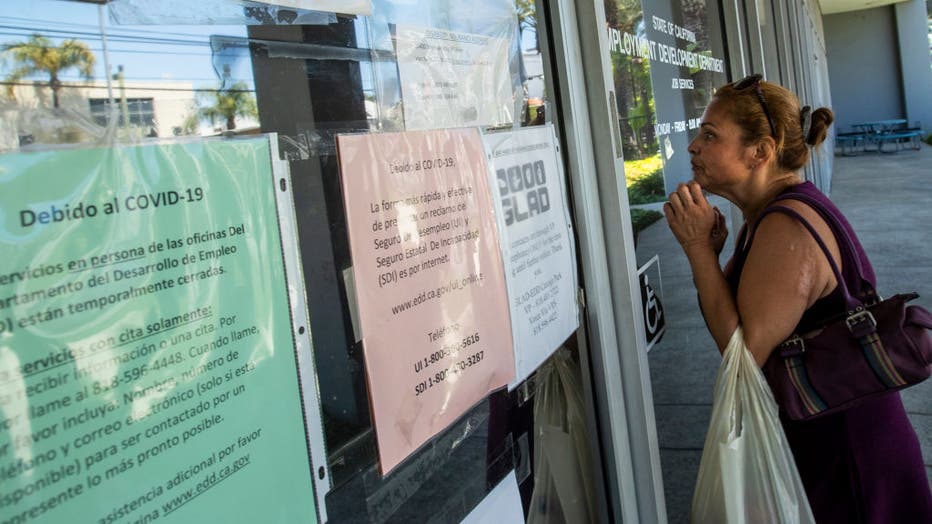Lawmakers say California jobless claims still a 'black hole'
SACRAMENTO, Calif. - A beleaguered California agency’s attempt to stem an unemployment benefits scam potentially exceeding $2 billion while reducing a frustrating backlog is failing, two state lawmakers from opposing political parties said Thursday, though others reported fewer problems.
Democratic Assemblywoman Cottie Petrie-Norris, who heads the Assembly Accountability and Administrative Review Committee, said she is seeing “a continued pattern of constituents who get lost in the process.”
Hundreds of residents across the state report “this sense of falling into a black hole where you don’t know what’s wrong, where you make phone calls that go unanswered, and you wait months and months for benefits and grow increasingly desperate,” she said.
Republican Assemblyman Jim Patterson, the committee’s vice chairman and a frequent critic of Gov. Gavin Newsom’s Democratic administration, cited complaints from two whistleblower employees of the Employment Development Department as well as customers who contacted his office in saying the new ID.me verification system “is failing substantially.”
The system frequently rejects legitimate forms of identification, requiring those seeking benefits to undergo a more painstaking verification that can take months, Patterson said. Other applicants are waiting as long as five hours to have their identity confirmed on a video chat call, he said.
Petrie-Norris said she and her colleagues were very hopeful the new verification system “was going to represent a positive turning point, and that doesn’t appear to be the case. So I think it’s fair to say there’s widespread concern and disappointment.”
The company did not respond to a request for comment, but department spokeswoman Loree Levy said video chat services are temporarily slowed after the system became overloaded when several other states also began using ID.me.
The “vast majority” of legitimate claimants should be able to use the automated process, she said in a statement, but “ID.me estimates up to 30% of attempts to get through ID.me in California are suspected scammers who are blocked from filing a claim,” including organized crime rings.

CANOGA PARK, CA - MAY 14: Brenda Bermudez came looking for information about her unemployment claim but found the California State Employment Development Department closed. (Brian van der Brug / Los Angeles Times via Getty Images)
Spokeswomen for other frequent Democratic Assembly critics including Lorena Gonzalez and Phil Ting said the verification process has not been a major recent issue.
“We still have some constituents with ID verification issues, but it is far less than what we were seeing in the spring and summer,” said Jen Kwart, a spokesman for Democratic Assemblyman David Chiu. “While nothing is perfect, I think overall we would say ID.me has been an improvement.”
However, she, like Patterson, wants the department to provide how many claims are being processed automatically and how many are being sent for a manual review.
Social media accounts also show a problem where unemployed workers are “falling into this black hole where they are being rejected for no reason, they cannot get their application to be approved and they are part of the huge backlog,” Patterson said at a news conference.
The benefits applications backlog has grown again in recent weeks and may face more strain with new stay-home orders affecting nonessential employees in most of California. But Thursday’s backlog of 725,051 initial and continuing claims was far below the peak of 1,695,102 on Sept. 24, before the department introduced the new verification system.
“It is not as high as the peak, but I am very concerned that it feels like we are not able to keep this under control,” Petrie-Norris said in an interview. ”We know that these are folks who have been waiting in some cases for months and they don’t know how they’re going to pay their rent, how they’re going to feed their kids, how they’re going to make it to the next day.”
Bank of America this week said California likely paid at least $2 billion in fraudulent unemployment benefits during the coronavirus pandemic, after a statewide lockdown in March caused millions of people to lose their jobs.
Other states are experiencing problems, but the bank, which issues the state’s debit cards containing the benefits, said the scale of fraud in California is unique in part because of the state’s failure to crosscheck claims with disqualifiers like the applicant being in prison or jail.
Petrie-Norris said she will introduce a bill next week requiring such crosschecks and removing what Newsom’s administration said are legal barriers. She also is proposing an oversight advisory board for the department.
In introducing the new verification tool in October, the department said its goal was to process more than 90% of claims automatically. At the time, their main concern was reducing the stubborn backlog.
About 64% of those who attempted to use the online verification process were successful in the early days of the program in October, the department said. Most were able to do so without assistance, but about 9% needed help on a video chat.


